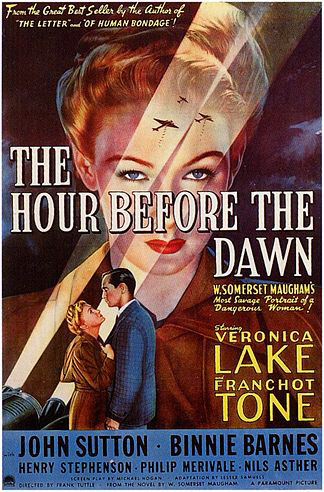
I don’t usually go into old movies blind, but I was excited to finally watch The Hour Before the Dawn (1944), one of Paramount’s elusive archive that has never been released on DVD. All I knew was that Veronica Lake was in it, that she played a German spy or sympathizer, and that the title sounded appropriately dramatic. Full of eager anticipation at watching one of Lake’s more obscure movies, and one with WWII espionage elements at that, I settled in for a good watch.
The fact that nobody in recent memory had reviewed it as “a lost classic” or “a real gem in the rough” should have been a tip-off that it wasn’t on anybody’s must-watch list…
The first thing that strikes the unsuspecting viewer, as the titles roll, is this.
Veronica Lake and…Franchot Tone?!
Okay, then. Unlikelier pairings have been successful: Fredric March and Veronica Lake, anyone? Besides, I like Lake and tolerate Tone. Hmm…credits, credits, more names…ooh, Miklos Rozsa score…
The second thing that strikes the viewer (after the Miklos Rozsa credit), is the director: Frank Tuttle. Three years earlier, Tuttle had directed Lake in This Gun For Hire, a tersely plotted, bona fide noir classic, and incredibly stylish to boot. We also note, in passing, that the movie is based on a story by W. Somerset Maugham. Well, not exactly “in passing.” We pan in on a giant leather-bound book, with “W. Somerset Maugham” in gilt letters.
This is your tip-off that the action-packed, thrilling spy story promised by the poster is going to have a distinctly literary flair. Because it’s Maugham, however, it’s not a tip-off that the film is going to plod along at the pace of a cracked quill pen on vellum – to wildly mix a metaphor. But mixing metaphors is okay, because The Hour Before the Dawn isn’t sure what it’s supposed to be, either.
Fade out on director. The movie opens in 1923, on the grounds of an English estate. General Hetherton (Henry Stephenson) watches his young son, Jim, shooting targets as practice before his first partridge season. In a flash, a tragic mistake sends Jim’s bullet straight into his beloved pet collie. The horrified audience of one – who was not expecting this opening to a WWII spy story – blinks in shock, as Jim blinks back tears. Gen. Hetherton shakes his head solemnly. (Reviewer Note: I blame Gen. Hetherton, who should have known better than to do what he did in the movie. Also, what are they doing shooting without a backstop? Those bullets could have hit more than the collie!)
On that cheerful note, the movie now shifts to 1939. Franchot Tone is reading the newspaper. Below the “WAR CLOUDS GATHER: Hitler poised to invade Poland” headline is an item on partridge season opening. The little boy Jim Hetherton is all grown up, and he’s still not planning to hunt partridges; in fact, he hates the idea of killing anything. We’re quickly introduced to the Hetherton family: patriarch Gen. Hetherton, Jim’s brother Roger (John Sutton), sister-in-law May (Binnie Barnes); and young nephew Tommy (David Leland). There’s also Dora Bruckmann. Dora (Veronica Lake) is an Austrian refugee serving as housekeeper/nanny/cook in the Hetherton household, and she’s caught Jim’s eye. We think he’s caught her eye, too.
Unfortunately, the efficient and lovely Dora is a fifth columnist. Her “refugee friends” in London are fellow spies, played by Aminta Dyne (the carnival fortune teller in The Ministry of Fear) and Nils Asther.
Meanwhile, the pacifist Jim is dealing with budding romance, imminent war, and being called up for military service. His family and acquaintances all express a range of opinions about him: scorn, disgust, baffled incomprehension, suspicion of cowardice. His father, understanding the origins of his feelings, disagrees but treats him with respect – even going so far as to rebuke others for speaking ill of Jim. Granted conscientious objector status, Jim is ordered to take a job on a farm, but no one will hire him. Finally, he gets a job after slugging a hired farmhand for beating a horse. This is the first instance in which Jim will achieve something by fighting somebody to stand up for other, deeper, principles.
The first half-hour or so is slow. Even the fifth columnist subplot is sluggish, not that there’s much of it. It’s slow, but it progresses, with Jim Hetherton’s story as the main focus.
At this point, one could reasonably expect the plot to continue following Jim and Dora in their respective occupations, interweaving the story threads until everything comes to an explosive conclusion. We get the explosion, but the story takes detours. Great, long, winding detours through pastoral countrysides, barely getting back to the main road just before it dead-ends.
On the pretext of showing Dora overhearing conversations and trying to signal German bombers with car headlights in a blackout, we spend lots of time (too much time) with Jim’s family, in slice-of-somebody’s-life interludes that include the wackiest Blitz scene you’ve ever seen. I think these moments were supposed to show the good old everyday life that soldiers are protecting, but I found myself wishing that John Sutton, Binnie Barnes & Co. would move away from his dad’s estate so we could get some peace and quiet.
Despite this, the basic idea had potential. So what if it’s not the thriller advertised? Unfortunately, the execution continues to fail miserably.
Problem No. 1: Franchot Tone and Veronica Lake. Together. No chemistry. At all. No wonder The Hour Before the Dawn was panned. Tone was good at what he did (he’s never been a favorite of mine), but he required a partner more lively and effervescent. Lake, meanwhile, needed both better lines, and…somebody else. Separately, they’re both well cast, but together? No dice.
I could forgive the slow pace, I could even forgive a lack of chemistry, but it’s hard to forgive an unfocused plot and a cardboard lead.
Problem No. 2: Veronica Lake’s fifth columnist is utterly, completely cardboard. Cardboard Nazis are all very well as incidental villains, but inexcusable in a lead. A main character requires a compelling personal motive, and some kind of story arc. Dora has none.
Unless Lake had major problems during filming that led them to cut her lines drastically (which is pure speculation; I’ve never heard any such rumor), whoever wrote the script did a horrible job. Because she barely has any lines. Most of them are the lines you’d hand the friend of the family who shows up in three scenes and provides an excuse for the story to move along. Bizarrely, she gets plenty of screen time, but 90% of it involves sitting in the background listening to people talk, and showing that she is Not One of Them by an arched brow, a sly smile, or an impatient flick of the radio dial. Spying: the really boring (and probably accurate) edition.
We’re never privy to how Dora feels, except at the very end, when she finally gets a chance for an emotional outburst. She’s a Nazi spy, and I guess that’s all the filmmakers decided we needed to know! It’s frustrating to the viewer, who expects (after seeing her so often) to finally get some character insight, but there’s none. Characters are supposed to change or explain themselves, but Dora never does.

Veronica Lake in a chic ensemble by Edith Head. Source
The Hour Before the Dawn marked a turning point for Lake, who received poor reviews and began a downward slide in her career. It’s possible that another actress could have pushed for better characterization and made more of the role, but if this is how it was written, it’s impossible to blame Lake. She could do good work, especially in comedies – as demonstrated by a string of successful pictures through 1943, the last being a memorable turn as a nurse in So Proudly We Hail!. She had also successfully teamed with Fredric March, Joel McCrea, and both William Holden and Ray Milland (in I Wanted Wings), so it wasn’t a case of only shining opposite Alan Ladd. Lake was never a great actress, but she was certainly a competent one. Unfortunately, there’s little chance for her to act, much less shine, here.
The film isn’t completely without merit. Franchot Tone gives a thoughtful performance as Jim, a man struggling with his conscience and the disapproval of society. Tone’s age works in his favor here, as a younger, more vital actor might have garnered more disapproval and less sympathy from the audience (especially in 1944). You have to believe that he’s sincere, not just young, stupid, or a coward. Tone convinces us of both his total aversion to killing, and his patriotic desire to support his country.
Surprisingly, the filmmakers handle his story sensitively, although they never dig deeply enough to offer a satisfying conclusion. He’s never vilified – although he’s arguably the most gullible character there is, nearly putty in the hands of Lake and her cohorts until fate (and Tommy) provide a revelation.
A few more things I appreciated – because this wasn’t a terrible movie, just a poor one:
1. Jim’s nephew Tommy (David Leland) is a not-entirely-annoying child character. He has a close relationship with his uncle, and it’s his scenes with Tone that help convey a sense of home and family. They’re pivotal in establishing a tangible example of something that’s important to Jim, beyond his anti-violence principles.
2. The radio is featured here; like many in WWII, the Hetherton family groups around the radio to hear important speeches – and that means we get to hear parts of them, too: King George VI’s speech on September 3, 1939 (aka the one at the end of The King’s Speech), and Winston Churchill’s July 14, 1940 “War of the Unknown Warriors” speech. The real recordings, not reenactments.
3. Here’s a plot point you don’t see often: the hero marries a Nazi. Who gets away with it. (For a little while.) They really should have milked this more.
4. Although Dora isn’t an in-depth character, her actions are ice-cold enough to persuade us that she had it coming when the inevitable happens. In the grand finale, she sets fire to a barn to guide incoming bombers, and only refrains from killing Tommy because it’s a waste of time. Dora is a conniving spy, who strings Jim along without committing herself, until the alien internment order forces her to marry him and thereby become a British citizen. Which she does in a flash, and then – in a clever twist of manipulation – tells him that the reason she decided to marry him so suddenly was because of the internment order. But she’s so up front and sweet about it that Tone sees it as frank honesty. Oh, how wrong he is…
5. Lake gets to wear a few glamorous costumes by Edith Head: chic tailored outfits with frivolous hats, a floaty dressing gown, and a hooded trench coat that I wouldn’t mind having in my own wardrobe.
Jim’s struggle with his conscience is solved, in the end; you knew it would be. Sadly, we never get to see the why. He kills Dora (it’s inferred, not pictured; he evidently pushes her from a window), and stumbles downstairs, looking sick. With that, the movie skips right to Jim as a grinning member of an air crew. What happened to those principles of his, and how is he faring after finding out his wife was a fifth columnist? We can guess, but the movie doesn’t explain.
The timing, too, was poor. The Hour Before the Dawn premiered on May 10, 1944 – one month before D-Day. The zeitgeist was all wrong. A movie about a conscientious objector finally turned soldier might have been better received in 1941 or even ’42 than 1944. Unfortunately, poor filmmaking ensured that it would never be picked up again as an overlooked classic.
Ultimately, The Hour Before the Dawn is too much of a mixed bag to be successful. Had the director/writers/other responsible parties handled things differently and focused on Tone while beefing up Lake’s role, this could have been a much better movie.
The poster looks nice, though. Kudos to the artist for creating an intriguing design; I’d watch that movie.

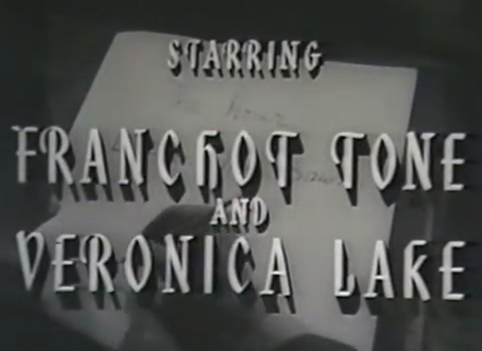

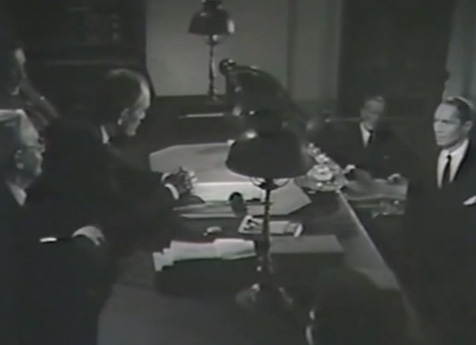
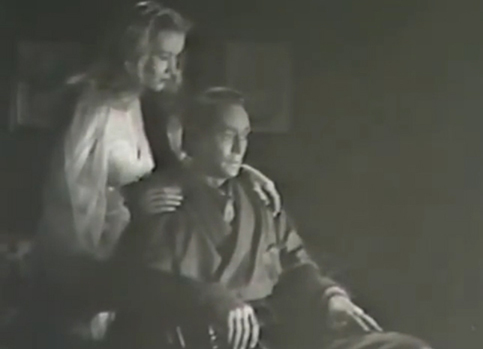
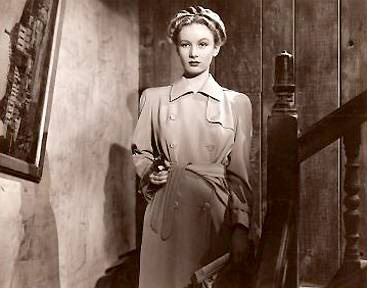

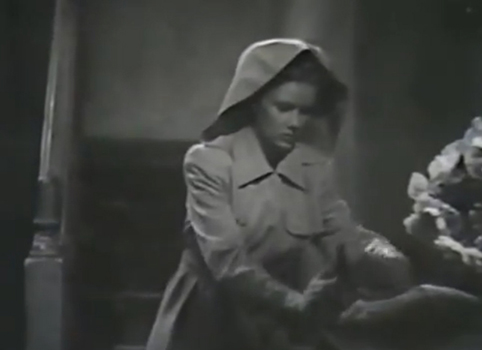
Pingback: A Cuppa Tea | The Counterfeit Writer